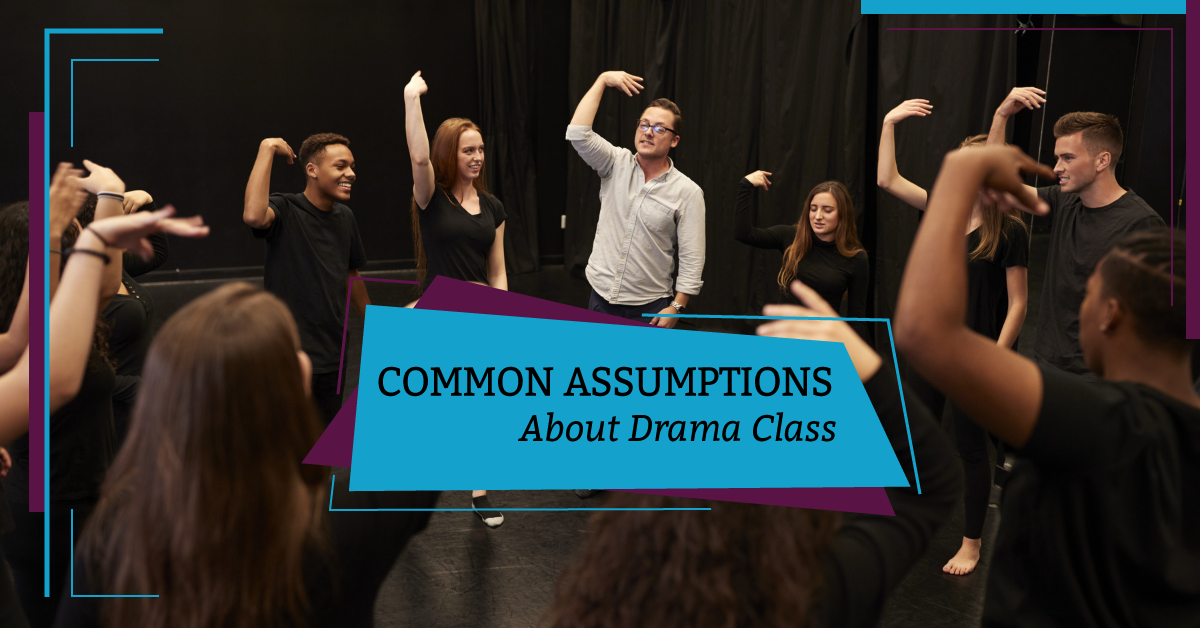There exists in everyone the potential for good or evil. Laramie Dean's adaptation of Dracula asks the question: How much would it take to bring out the darkness inside of you?
Common Assumptions About Drama Class
There are lots of reasons why students choose to take drama class. But unfortunately not all of them are positive reasons. On the other hand, students also come up with lots of reasons to avoid taking drama class. In this article, we look at four common assumptions students often have about taking drama class, with different thoughts about why these assumptions are false.
1. “I’m taking drama because it’s easy.”
Teachers, we know that drama class isn’t easy. But unfortunately some students will take drama because they think they’re going to breeze through it, and not because they are actually interested in drama .
At the beginning of the semester, it is useful to sit down with your students to find out their thoughts, expectations, and goals for taking drama. If students respond that they think drama class is easy, be sure to have them describe why. With that information, you can then work with your students specifically to teach them that drama class isn’t necessarily easy; it’s different, and that’s a good thing.
Go through your course syllabus with your students and discuss the differences from other classes. For example, does your drama class have a final written exam, or a large practical project (say, selecting and directing a scene) instead? What does the project entail? How many hours might a student spend working on this project, compared to studying for a math exam? How much physical energy does a student spend choosing, memorizing, rehearsing, and performing a monologue (for example) versus completing an essay in English class? Which is “easier,” and why? If students don’t know, it’s okay. You can come back to this discussion when you are working on those specific units.
This is also a great opportunity for students to work on their empathy skills. Remind students that just because one person thinks that something is easy, it doesn’t mean it is easy for everyone else.
A word of caution – when working with students on the “easy versus different” concept, you will need to find a balance between sounding desperate to legitimize your drama program and scaring students into thinking they’ve signed up for an impossibly difficult class. It is important to listen more than speak, and allow your students to lead the discussion. It also may be useful to discuss how the skills in drama class can be applied to many different situations – in other classes and in the “real world” as well. Check out What Skills do you Need to Work on a Show for more.
2. “I’m only taking drama because I hate visual art/music/dance.”
Students are required to have an arts credit in order to graduate, and many students take drama because they think they can’t draw, read sheet music, or coordinate their limbs. However, visual art, music, and dance feature heavily in drama classes!
Students may not be learning traditional dance technique in drama class but they will be exploring different types of movement and ways of communicating by using their bodies (think mime, tableau, or stage combat). Students will explore different vocal sounds and sound effects, soundscapes, and how music can affect a scene. And if their drama class has a musical theatre unit, students may end up singing anyway! Maybe students don’t use pastels and gouache, but they will eventually design and create props, costumes, and sets, either by drawing/painting and constructing the items or by using found objects creatively.
Drama is one of the most cross-curricular subjects out there, so regardless of students’ opinions on visual art, music, and dance, they’ll eventually use those skills in the drama classroom. Discuss the term “cross-curricular” with your students. Have them come up with ways students learn and practice cross-curricular skills in drama class, as well as how skills in the drama classroom can be used in other classes. Take it a step further and have students create brief scenes from this brainstorm – use the “Dramatic Rules” game as a framework.
3. “I’m not going to be an actor, so I’m not going to learn anything in drama class” or, “It’s not useful for the future.”
We wrote a whole post about how studying drama benefits students outside the drama classroom! The skills that students learn in drama class are definitely transferable to so many life experiences, including time management, problem-solving, dealing with nerves when they arise, and growing confidence.
On top of that, there is a myriad of theatrical jobs that are not acting jobs: technical roles, design roles, stage management, sewing, construction and carpentry, musical direction, choreography, front-of-house and box office roles, theatre management roles, and more. Drama class is not just for actors!
4. “You have to be super creative to take drama” or “I’m not creative enough to succeed in drama class.”
When it comes down to it, creativity is all about trying new things. Students often feel that they aren’t creative. Or they compare their perceived creativity (or lack thereof) to that of others. Drama class is not about who is the most creative. It is about being brave and willing to try new things. Each student is different, and you never know what might inspire some unexpected creativity.
There are so many fascinating aspects of drama class that there is bound to be something to make each student feel confident, successful, and creative. It could be one of many different types of design, stage management, playwriting, directing, singing, improvisation, creating scenic elements. It just takes bravery and patience on the part of students to find that particular thing that works for them. Check out our articles Kicking Creativity out of the Drama Classroom and Prompting Creativity in the Classroom for more.



